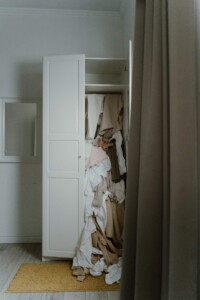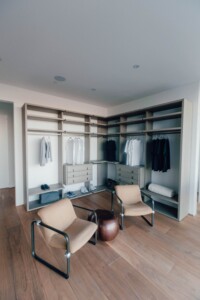
This topic was inspired by a recent remote client who went out of her way to photograph the inside of her home’s closets, in addition to the rooms. I’ve been asked all kinds of questions over the last 30+ years and the subject of closets does come up once in while. Often, it is in relation to clutter and whether or not clutter that is hidden behind a closet door can influence an occupant. The answer to that question is yes, of course. Anything chronically going on in your home that bothers you will eventually depress your immune system. That is not just feng shui “philosophy,” but also something which has been substantiated by scientific studies.
Most closet doors are flush with the room’s walls. For those closets which protrude out in the room, there is potential for the corner edge of the closet to align with the person’s door, desk or their bed. This is not ideal as the 90 degree corner edge is perceived as a small “poison arrow.” If you have a protruding closet edge into your bedroom or home office, try to position your body away from this architectural flaw. Otherwise, they are known to trigger some physical ailments.
Mirrored closet doors come and go, in terms of style, but there is a long-standing finding in Feng Shui practice that large mirrors can cause sleep disturbances. And yet, large, mirrored closet doors in a small room can bring in the illusion of more space and light, which is desirable from a design standpoint as well as in Feng Shui practice. For a bedroom, the general advice is to cover them with wall paper, drape a curtain over the mirrored closet door when sleeping in the room, or replace with non-mirrored doors.
The closet is usually not an issue. Once in a while, a person will have a very large closet, even a walk-in closet the size of an ordinary room, but they still don’t spend much time in that area of the house, compared to other areas. Over the years, I have had just a handful of clients who turned a closet into an informal office space. One man had a comfortable chair in his spacious closet and he took phone calls from that location. Another client practiced with his musical instrument inside a very large closet. Sometimes the hanging clothes can even work as a sound barrier.

In cases like these, we can hope that the closet naturally falls in a positive zone of the house. Otherwise, in the Feng Shui design phase, closets can be intentionally placed in the areas deemed less innately positive since all structures start out with a combination of positive and negative zones to capitalize on. We prefer to relegate the unimportant spaces to the negative zones whenever possible.
There is nothing inherently wrong with a usable closet where the doors have been completely taken off. If the closet is not overly full and is organized, it may not even be a “bad view” and therefore, not a problem to look at constantly. Most people, however, prefer to hide what would be “visual clutter” with the things we normally store behind closed doors.
In one of my previous homes, I created a closet that was about 4 feet deep and 20 feet long. This was a former garage turned into a den long ago. It was amazing that, in spite of reducing the room’s floor space by 80 square feet, hiding all the “stuff” in that room (read: boyfriend’s clutter), the room ended up looking bigger than before. And this is one reason why people complain about not enough closet space; we often do need to hide the sheer volume of stuff we have, but don’t want out on display.
Author: Kartar Diamond
Company: Feng Shui Solutions ®
From the Feng Shui Architectural & Design Blog Series

